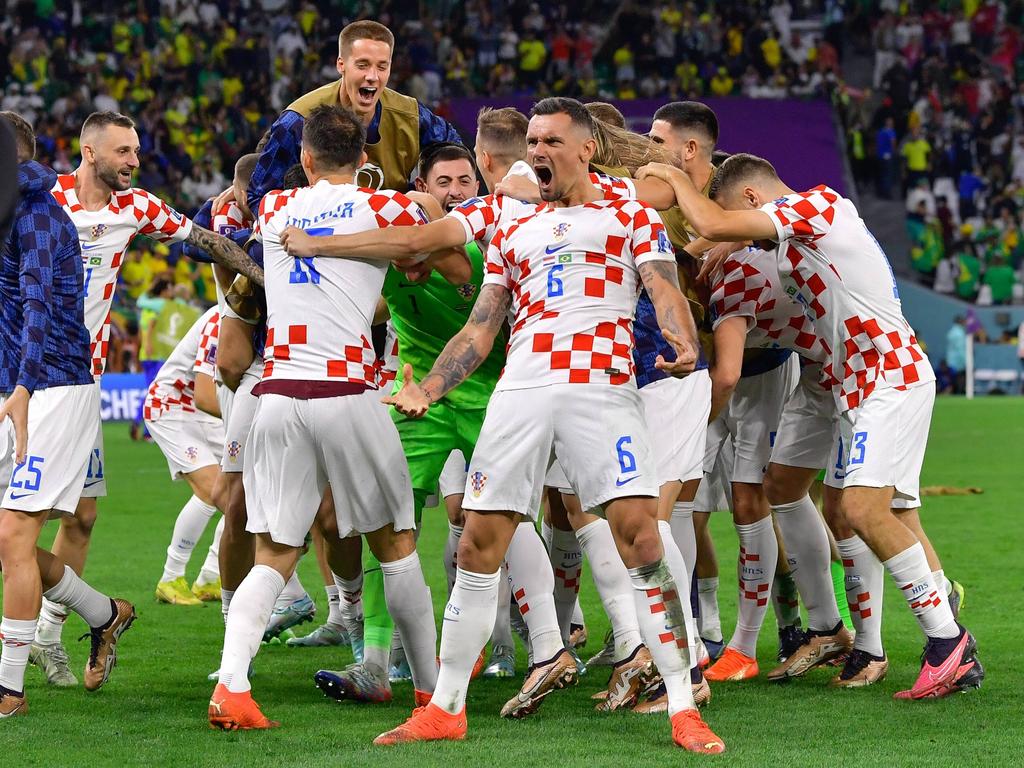Dinamo Zagreb -- cradle of Croatia's World Cup team

Three Dinamo Zagreb players, including penalty shootout king Dominik Livakovic, have gone from playing in front of several thousand fans in a neglected stadium to the brink of the World Cup final.
As Croatia prepare to face Argentina in Tuesday's first semi-final, the outstanding Livakovic as well as his Dinamo teammates Bruno Petkovic and Mislav Orsic can all expect to play a key role.
The influence of Dinamo on the current team, and the one that reached the World Cup final four years ago, cannot be overstated -- eight other players in the squad in Qatar, including Croatia's greatest ever player Luka Modric, were developed by the club.
Goalkeeper Livakovic has been a national hero ever since he saved three penalties in the last-16 shootout against Japan.
"King Livi", as Croatian media call him, cemented that status after Croatia's 4-2 win over Brazil on penalties in the quarter-final, when he saved Rodrygo's attempt.
Substitute Petkovic scored in extra time from a cross supplied by his clubmate Orsic to force the 1-1 draw against Brazil that led to that penalty drama.
The Jutarnji List daily praised the "trio who earn their bread in Croatian league stadiums, playing often in an obscure atmosphere in front of one or two thousand fans".
While the nation of 3.9 million people has enjoyed success internationally, at home it is struggling with hooliganism, corruption and poor infrastructure.
A stand of Dinamo's Maksimir stadium has been closed since March 2020, when it was damaged by a powerful earthquake that hit Zagreb.
Since Croatia gained independence from Yugoslavia in 1991, the club has dominated Croatian football, winning 23 national championships and 16 cups.
Since 2006, Dinamo have failed to win the title just once, when Rijeka took the honours in 2017.
"Dinamo as a word symbolises force, power. And Dinamo Zagreb is the source of the energy of Croatia's squad," prominent Croatian sports journalist Dean Bauer told AFP.
Another Dinamo player, Josip Sutalo, is a fringe member of the squad in Qatar.
Eight other players in the squad came through the ranks at Dinamo, including the midfield trio spearheaded by Real Madrid superstar and 2018 Ballon d'Or winner Modric, with Mateo Kovacic and Marcelo Brozovic.
The other Dinamo products are Andrej Kramaric and Lovro Majer, outstanding 20-year-old centre-back Josko Gvardiol and defenders Dejan Lovren and Borna Sosa.
Although Dinamo were not Livakovic's first club, he arrived there in 2015 at the age of 20.
Many of Croatia's biggest names of the past -- Zvonimir Boban, Robert Prosinceki, Dario Simic, Vedran Corluka or Niko Kranjcar -- also started at Dinamo.
Brazil-born striker Eduardo da Silva, who scored 29 goals in 64 appearance for Croatia, arrived at Dinamo as a 15-year-old and played there from 1999 until 2007.
Dinamo's football school is considered the best in the country and the most talented young players clamour for a place in it.
Besides the school, Dinamo have developed a scouting network at home and in neighbouring Bosnia.
But Dinamo Zagreb is also known for its controversial former boss Zdravko Mamic, sentenced to jail over a multi-million-euro graft, who is still widely perceived as the strongman of Croatian football.
Mamic, who is hiding in Bosnia where he fled just ahead of the verdict, was Dinamo executive vice-president from 2003 until 2016.
In 2018, Mamic was sentenced to six years and six months in jail.
He was found guilty along with his brother and former Dinamo coach Zoran Mamic, as well as a former club director and a tax inspector, of graft which cost Dinamo more than 15 million euros ($16 million) and the state 1.5 million euros.
The cash was embezzled through fictitious deals related to the transfers of players, notably for Modric and Lovren.
Although Mamic is not officially linked with the club any more, according to local media reports all important decisions relating to Dinamo still go through him.
Despite his conviction, experts say that Mamic has managed to create a well-organised club which has become the nucleus of the country's international success.
Dinamo are now heading towards their 24th title led by Ante Cacic, who was Croatia coach from 2015 to 2017 when he was succeeded by current national coach Zlatko Dalic.








